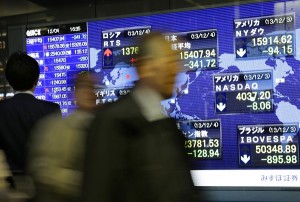
People walk by an electronic stock indicator in Tokyo, Wednesday, Dec. 4, 2013. Most Asian stock markets fell Wednesday, led by losses in Japan, as investors continued to worry the U.S. Federal Reserve will soon start reducing its monetary stimulus. Japan’s Nikkei 225 fell 2 percent to 15,407.94, pulling back from Tuesday’s rise and levels that were the index’s highest in about six months. AP PHOTO/SHIZUO KAMBAYASHI
HONG KONG—Asian markets were mixed on Wednesday, but traders are growing concerned that recent upbeat US data could prompt the Federal Reserve to begin cutting down its stimulus program this month.
Exporters listed on Japan’s Nikkei suffered as profit-taking hit the dollar, which had been close to a six-month high against the yen on Tuesday.
Tokyo tumbled 2.17 percent, or 341.72 points, to 15,407.94 and Seoul dropped 1.12 percent, or 22.56 points, to 1,986.80. Hong Kong fell 0.76 percent, or 181.77 points, to 23,728.70.
Sydney ended 0.34 percent, or 17.7 points, higher at 5,273.8, reversing earlier losses that were fueled by slowing Australian growth figures.
And Shanghai added 1.31 percent, or 29.09 points, to 2,251.76. Traders picked up bargains after losses earlier in the week sparked by Chinese plans to restart initial public offerings.
Eyes are on the release this week of US economic indicators—with the main focus on Friday’s non-farm payrolls data—which will provide some clarity on the Fed’s plans for its $85-billion-a-month bond-buying scheme.
Traders fear strong jobs figures will increase the likelihood of a pullback as early as the bank’s next policy meeting in two weeks’ time.
Among other US data due for release this week are figures for third-quarter growth and home sales, while the Fed will open up its Beige book on regional economies.
On Tuesday the Dow fell 0.59 percent and the S&P 500 dipped 0.32 percent—both having struck record highs last week. The Nasdaq eased 0.20 percent.
“In a return to the good news is bad news theme, international equity markets were sold (Tuesday). Investors responded to solid economic data by worrying about the looming Fed taper programme,” CMC Markets chief analyst Ric Spooner said in a note, according to Dow Jones Newswires.
In forex trade the dollar fetched 102.80 yen from 102.48 yen in late New York trade, having peaked at 103.30 yen in Tokyo earlier Tuesday—its highest since late May.
“With no US economic data (Tuesday), profit-taking drove the dollar lower,” said Kathy Lien of BK Asset Management.
The euro bought 139.53 yen from 139.27 in the US but was sharply lower than the five-year high of 139.73 yen touched in Asia Tuesday. The single currency was also at $1.3574, compared with $1.3589 in New York.
Lien also responded to news that China’s yuan had overtaken the euro to become the second most used currency in international trade finance, after the dollar.
“While actual trading in the currency remains miniscule compared to the majors, the use of the currency for trade is increasing rapidly, especially as China searches for ways to remove exchange risk and reduce the use of dollars,” she said.
The yuan’s market share in traditional trade finance reached 8.66 percent in October, passing the euro at 6.64 percent, the Society for Worldwide Interbank Financial Telecommunication (SWIFT) said Tuesday.
In Sydney the S&P/ASX 200 clawed back earlier losses despite data showing economic growth slowed to 2.3 percent year-on-year in July-September, below the previous quarter’s 2.6 percent. Analysts had also expected growth of 2.6 percent in the latest quarter.
CMC Markets chief market strategist Michael McCarthy said the losses turned to gains “as traders interpreted the slower growth as a sign interest rates will remain lower for longer.”
On oil markets New York’s main contract, West Texas Intermediate for January delivery, was up $1.13 at $97.17 a barrel. Brent North Sea crude for January fell 12 cents to $112.50.
Gold fetched $1,212.30 per ounce at 1044 GMT compared with $1,219.85 on Tuesday.
In other markets:
— Taipei rose 0.30 percent, or 25.45 points, to 8,418.00.
Hon Hai rose 1.15 percent to Tw$79.0 while Taiwan Semiconductor Manufacturing Co. was 0.96 percent higher at Tw$105.0.
— Wellington slipped 1.04 percent, or 49.70 points, to 4,734.16.
Contact Energy fell 1.1 percent to NZ$4.70 and Fletcher Building was 0.11 percent off at NZ$9.24.
— Manila closed 1.20 percent lower, giving up 74.27 points to 6,105.23 and ending a five-day winning streak.
SM Investments fell 0.55 percent to 726 pesos, Philippine Long Distance Telephone dropped 1.39 percent to 2,704 pesos and Ayala Land plunged 4.29 percent to 26.80 pesos.
— Jakarta closed down 1.11 percent, or 47.46 points, at 4,241.30.
Car maker Astra International fell 1.57 percent to 6,250 rupiah, while palm oil producer Astra Agro Lestari rose 1.54 percent to 23,050 rupiah.
— Singapore closed down 0.85 percent, or 26.97 points, at 3,160.70.
Singapore Telecom eased 0.54 percent to Sg$3.69 while agribusiness company Wilmar International was down 0.85 percent at Sg$3.50.
— Kuala Lumpur lost 0.13 percent, or 2.39 points, to 1,821.90.
Hong Leong Financial Group fell 4.6 percent to 15.26 ringgit, while Telekom Malaysia rose 2.5 percent to 5.30 ringgit.
— Bangkok lost 0.52 percent, or 7.26 points, to 1,376.63.
Telecoms company Advanced Info Service fell 1.33 percent to 223 baht, while power giant Electricity Generating Public Co. dropped 1.56 percent to 126.50 baht.
— Mumbai fell 0.70 percent, or 146.21 points, to 20,708.71.
Property firm Unitech shed 9.54 percent to 15.65 rupees while pharma firm Wockhardt lost 3.82 percent to 403.15 rupees.—Danny McCord